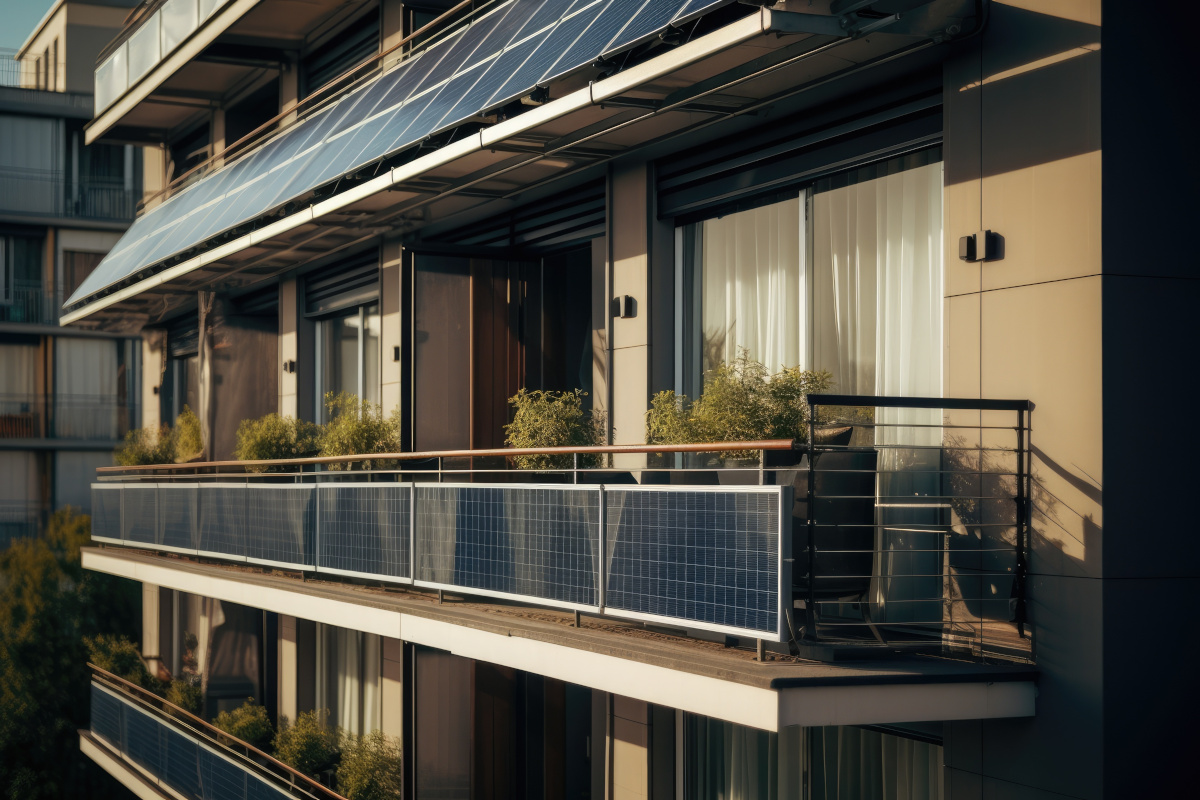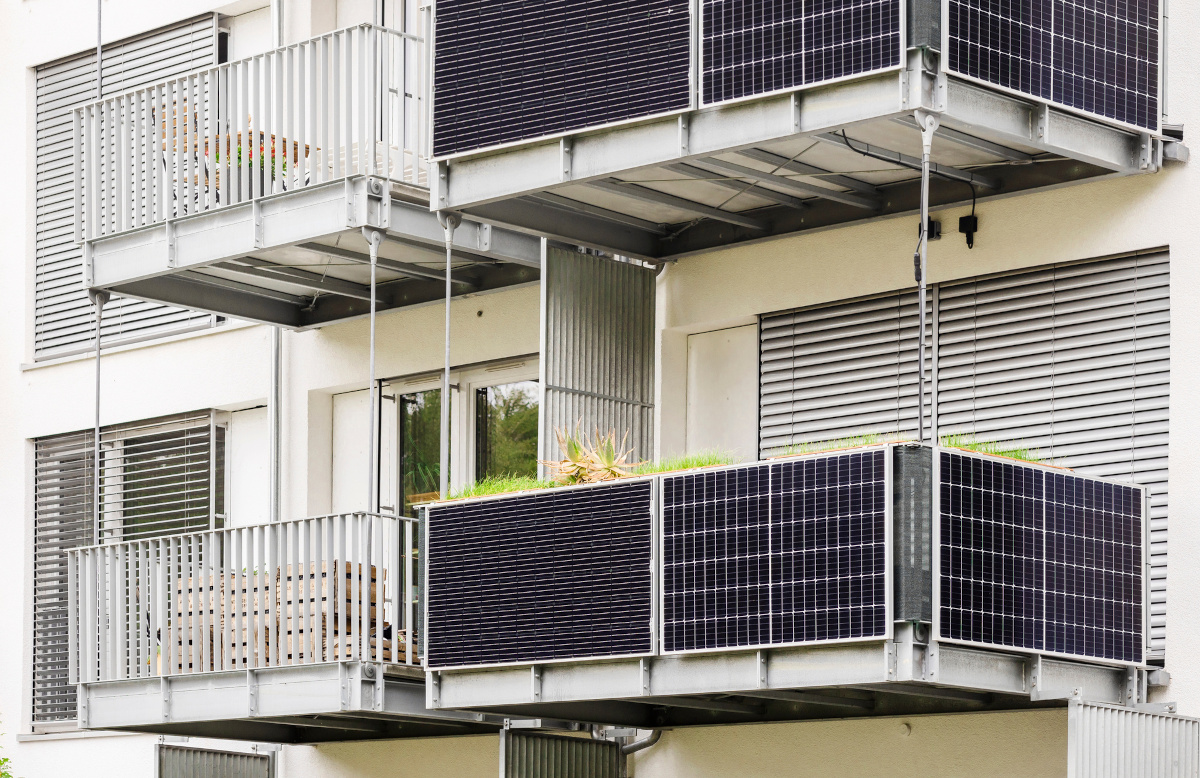Solar Potential In Urban Living:
A Quick Guide To Solar Panels For Apartments

In recent years, urban communities have shown growing interest in solar energy. This shift is driven by the desire for sustainable and cost-effective energy solutions. In cities, where traditional solar panel installation can be challenging, residents are looking for alternative ways to harness solar power.
Our article delves into the world of solar panels suitable for apartment living. It aims to guide apartment dwellers through the various solar panel options available, tailored to meet the unique constraints and opportunities of urban environments.
1. Understanding Solar Panels For Apartments
Urban dwellers have unique needs when it comes to harnessing solar energy. Here, we explore the types of solar panels suitable for apartment living, focusing on their features and urban applicability.
- Portable Solar Panels
Ideal for renters or those with limited space, these panels are easy to set up and store. They can be used on balconies or windowsills to power small devices.
- Rigid Solar Panels
These panels are a more permanent solution. They work well on sturdy, flat surfaces like rooftops. Their durability makes them a long-term investment for energy generation.
- Flexible Solar Panels
Perfect for irregular surfaces or temporary setups. These panels can be attached to curved areas and are easy to move, providing a versatile option for changing urban spaces.
Each type offers a way to tap into solar energy, despite the constraints of apartment living. By choosing the right panel, urban residents can effectively participate in the renewable energy movement.
2. Innovative Solar Solutions For Apartment Dwellers
Innovations in solar technology are making it easier for apartment residents to access renewable energy. Three such innovations are:
- Solar Window Blinds And Solar Glass Technology
These blinds and windows serve dual purposes. They let in light while also harnessing solar energy. They can power small appliances, reducing reliance on traditional energy sources. - Community Solar Projects
These initiatives allow entire apartment complexes to benefit from solar energy. Residents can subscribe to a shared solar energy system, which helps reduce energy costs for the entire building. - Integration Of Solar-Powered Appliances
Solar-powered appliances such as air conditioners, fans, and lighting systems offer an efficient alternative for urban apartments. By connecting these appliances to installed solar panels, they operate independently from conventional energy sources.
These solutions offer practical and effective ways for apartment dwellers to engage with solar energy, contributing to a greener urban environment.
3. Installation And Maintenance
Installing solar panels in apartments often requires creative solutions. Use vertical spaces like balcony railings or window areas for portable or flexible panels. For rigid panels, seek permission for rooftop installation. Ensure the area receives ample sunlight and avoid shaded spots.
Maintaining these panels involves regular cleaning and inspection. Dirt and debris reduce efficiency, so clean them every few months. Costs for maintenance are generally low, but factor in potential repairs or replacements over time. Always consult professionals for installation and maintenance to ensure safety and optimal performance.

4. Benefits Of Solar Panels In Urban Areas
The adoption of solar panels in urban settings brings significant benefits, both environmentally and economically.
- Environmental Impact
By using solar panels, urban residents significantly reduce their carbon footprint. Solar energy is a clean, renewable source that doesn't emit greenhouse gases. This shift to solar contributes to a healthier urban environment and aids in combating climate change. - Economic Advantages
Solar panels offer substantial savings on electricity bills. Over time, the initial investment is offset by the reduction in energy costs. Additionally, some regions offer incentives or rebates for using renewable energy, further enhancing the economic benefits. - Increased Energy Independence Solar panels empower urban residents with greater energy independence. By generating their own electricity, they rely less on the grid, reducing vulnerability to power outages and fluctuations in energy prices.
- Enhanced Property Value
Implementing solar technology can increase a property's value. Apartments with solar panels are often more attractive to eco-conscious buyers and renters, leading to higher resale values and rental rates. - Support For Local Economies
Adopting solar panels in urban areas can stimulate local economies. It creates demand for solar technology, installation, and maintenance services. This demand can lead to job creation in the renewable energy sector. Supporting local businesses and professionals in this field contributes to the overall economic health of the community.
Integrating solar panels into urban living not only supports environmental sustainability but also provides financial relief in the long run. This makes solar energy a practical and responsible choice for city residents.
Conclusion
Incorporating solar panels into urban apartments reflects a practical approach to energy usage. It demonstrates a commitment to both environmental responsibility and economic sensibility. As urban residents increasingly turn to solar solutions, they set a precedent for sustainable urban living. This shift has the potential to reshape our urban landscapes, making them more energy-efficient and environmentally friendly.